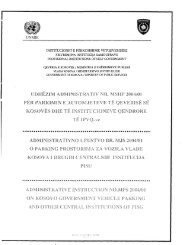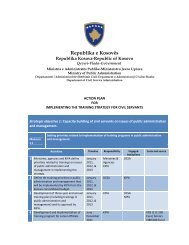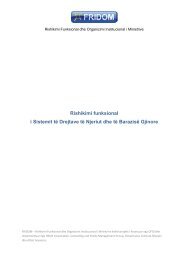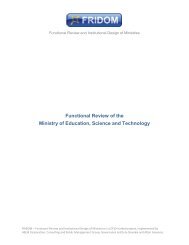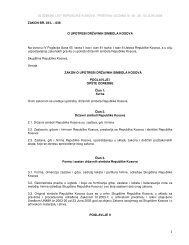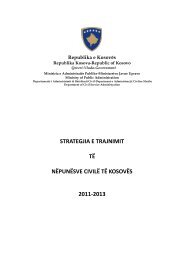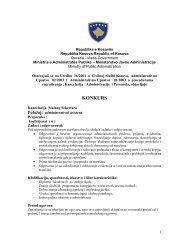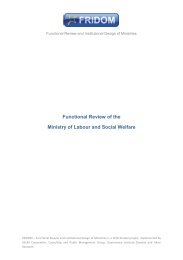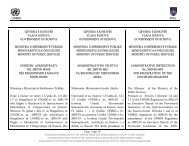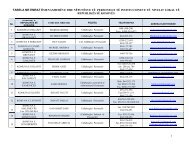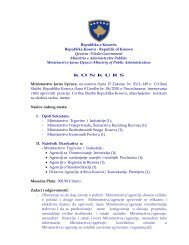Functional Review of the Ministry of Environment and Spatial Planning
Functional Review of the Ministry of Environment and Spatial Planning
Functional Review of the Ministry of Environment and Spatial Planning
You also want an ePaper? Increase the reach of your titles
YUMPU automatically turns print PDFs into web optimized ePapers that Google loves.
environmental education / education for sustainable development 90 %<br />
environmental legislation 63.4%<br />
nature protection 80%<br />
rural development 73.4%<br />
sustainable development 70%<br />
<strong>Environment</strong>al NGOs have intermediate levels <strong>of</strong> performance. However, <strong>the</strong>y have a problem developing<br />
activities which would better respond to or reflect <strong>the</strong> needs <strong>of</strong> <strong>the</strong> citizens. NGOs are <strong>of</strong>ten donor driven<br />
<strong>and</strong> do not have <strong>the</strong> support <strong>of</strong> <strong>the</strong> government.<br />
The Consultants’ opinion is that <strong>the</strong> departmental capacity to tackle <strong>the</strong>se issues is highly<br />
underdeveloped.<br />
Recommendation III.6: An environmental communication strategy with <strong>the</strong> external bodies should be<br />
developed <strong>and</strong> applied in <strong>the</strong> practice.<br />
III.2 ENVIRONMENTAL INSPECTION DEPARTMENT<br />
The new laws in environmental protection require both: environmental impact assessment (EIA) <strong>and</strong><br />
strategic environmental assessment (SEA) procedures. This would in principle involve early notification,<br />
screening, public participation <strong>and</strong> access to information as well as to decision-making.<br />
<strong>Environment</strong>al inspection <strong>and</strong> enforcement could be conducted pursuant to Art. 80 - 95 <strong>of</strong> <strong>the</strong> Law on<br />
<strong>Environment</strong>al Protection [No. 2009/03 L-025]. However, procedural issues have not been addressed yet,<br />
so inspection <strong>and</strong> enforcement <strong>of</strong> <strong>the</strong> legal provisions is not possible. Major deficiencies have been<br />
identified at <strong>the</strong> Inspectorate for <strong>Environment</strong> <strong>and</strong> Water. There is a very low number <strong>of</strong> genuinely<br />
pr<strong>of</strong>essional environmental inspectors. There is a critical lack <strong>of</strong> respective legislation, applicable working<br />
methodology, relevant environmental st<strong>and</strong>ards <strong>and</strong> proper co-ordination <strong>of</strong> <strong>the</strong>ir activities as well as<br />
enforcement processes. There is no one accredited laboratory in Kosovo which covers <strong>the</strong> whole country.<br />
This is due <strong>the</strong> obligatory downsizing <strong>of</strong> <strong>the</strong> ministry staff resulting in all regional <strong>of</strong>fices being closed.<br />
Modern enforcement concepts <strong>and</strong> st<strong>and</strong>ards, as envisaged by <strong>the</strong> promulgated primary legislation, are not<br />
yet in use. The MESP inspectors nei<strong>the</strong>r use st<strong>and</strong>ard inspectoral procedures nor st<strong>and</strong>ards as inspection<br />
parameters.<br />
Recommendation III.7: Drafting <strong>of</strong> an environmental inspection bylaw <strong>and</strong> <strong>the</strong> necessary associated<br />
instructions that provide <strong>the</strong> legal <strong>and</strong> regulatory framework for implementing inspection <strong>and</strong> enforcement<br />
functions is a priority objective. MESP should enhance inspection, control <strong>and</strong> enforcement <strong>of</strong> legislation's<br />
specific objectives to include <strong>the</strong> following:<br />
Effective operation <strong>of</strong> <strong>the</strong> national inspection system;<br />
Developing <strong>and</strong> implementing an environmental self-compliance <strong>and</strong> corporate environmental responsibility<br />
system by <strong>the</strong> industries;<br />
Implementation <strong>of</strong> <strong>the</strong> environmental settlement plans with industries;<br />
Developing special inspection programmes for environmental compliance.<br />
Regarding <strong>the</strong> experts opinion, <strong>the</strong> inspection <strong>and</strong> enforcement function creates <strong>the</strong> most serious difficulty<br />
in <strong>the</strong> current environmental administration in Kosovo.This particular field <strong>of</strong> environmental administration<br />
needs <strong>the</strong> highest priority to improve its performance. Any <strong>of</strong> routine process in environmental inspection,<br />
i.e. inspection planning, compliance monitoring, documenting <strong>of</strong> inspection <strong>and</strong> eventual enforcement<br />
process is not in practice in Kosovo. This is because: a) missing secondary legislation; b) insufficient<br />
organization <strong>of</strong> Inspectorate; <strong>and</strong> c) lack <strong>of</strong> practical experience. A properly organized programme <strong>of</strong><br />
environmental inspections is one <strong>of</strong> <strong>the</strong> key success factors’ in environmental management.<br />
Recommendation III.8: Implement a training programme in <strong>the</strong> environmental inspection <strong>and</strong><br />
enforcement using EU recognized trainers.<br />
23



